
Rigas Feraios or Velestinlis ; 1757 – 24 June 1798), born as Antonios Rigas Velestinlis, was a Greek writer, political thinker and revolutionary, active in the Modern Greek Enlightenment. A victim of the Balkan uprising against the Ottoman Empire and a pioneer of the Greek War of Independence, Rigas Feraios is today remembered as a national hero in Greece.

Georgios Grivas, also known by his nickname Digenis, was a Cypriot general in the Hellenic Army and the leader of the Organization X (1942-1949), EOKA (1955-1959) and EOKA B (1971-1974) organisations.
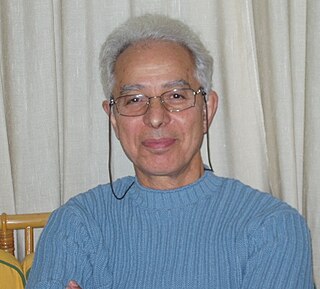
Kyriakos Charalambides is one of the most renowned and celebrated living Cypriot poets. His poetry, essays, translations, and critical analysis celebrate the ideas of Western civilisation, expressed through the language and history of Greek culture. His poetic opus adds to the tradition established by such modern Greek poets as Constantine P. Cavafy, Giorgos Seferis and Odysseas Elytis. His poetry though holds steadfastly to the Greek Cypriot linguistic register.

The Modern Greek Enlightenment was the Greek expression of the Age of Enlightenment.
Iosipos Moisiodax or Moesiodax was a Greek philosopher, an Eastern Orthodox deacon, and one of the greatest exponents of the modern Greek Enlightenment. He was also director of the Princely Academy of Iaşi.
Hellenic studies is an interdisciplinary scholarly field that focuses on the language, literature, history and politics of post-classical Greece. In university, a wide range of courses expose students to viewpoints that help them understand the historical and political experiences of Byzantine, Ottoman and modern Greece; the ways in which Greece has borne its several pasts and translated them into the modern era; and the era's distinguished literary and artistic traditions.

Yorgos Kypris, born 1954, is a Cypriot sculptor who lives and works between Athens and Santorini in Greece. He continues to take part in numerous solo and group exhibitions, commissions work, designs jewelry and permanently exhibits his work through MATI, his personal art gallery. His work has been published in a number of books, articles and magazines. His best known works include the "Entrapped Fish" installation, at the Lobby of the World Bank Building, Washington D.C., commissioned in 1997, the "Gate of Knowledge" - a sculptural steel gate, erected in 1998 in the yard of St. Paul High school, Pafos, Cyprus, the body of works "Fish" (1993-), the "Parallel Notions" body of works (2001) and the "Observers", an installation of four sited figures on poles, 4,5m high each, commissioned (2002) at Fabrica Commercial Center, Fira, Santorini, Greece.
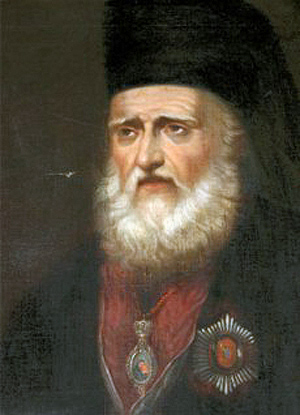
Eugenios Voulgaris or Boulgaris was a Greek Orthodox cleric, author, educator, mathematician, astronomer, physicist, and philosopher. He wrote about every discipline: legal, historical, theological, grammatical, linguistic, astronomy, political, mathematics, archaeology, music, secularism, euthanasia, and the tides. He wrote speeches, poems, appeals to Catherine II for the liberation of Greece, and hundreds of letters. He edited valuable editions of Byzantine writers and classical books and translated many texts from Latin into French. He was one of the students of Methodios Anthrakites. He translated many important foreign language academic documents to Greek. He was bishop of Cherson. He was a leading contributor to the Modern Greek Enlightenment.
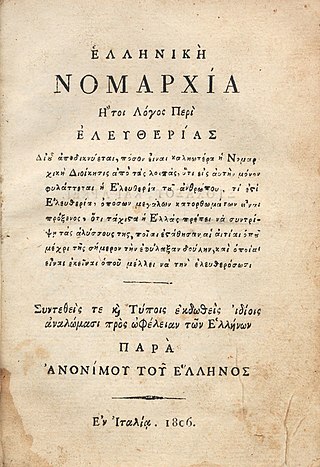
Hellenic Nomarchy was a pamphlet written by "an Anonymous Greek" published and printed in Italy in 1806. It advocated the ideals of freedom, social justice and social equality as the main principles of a well-governed society, making it the most important theoretical monument of Greek republicanism. Its author, arguing for both social autonomy and national sovereignty, supported the Greek struggle for national liberation and turned to the moral greatness of ancient Greece in order to stimulate collective pride. Although this work was widely read by Greeks before the outbreak of the Greek War of Independence in 1821, from its first appearance it was received with discomfort by its contemporary audience, and later generated scholarly debates on the identity of its author.
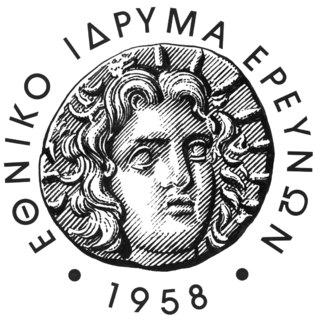
The National Hellenic Research Foundation is a non-profit, private-law legal entity established in 1958 with the aim of conducting interdisciplinary research in the fields of science and the humanities. It is supervised by the General Secretariat for Research and Technology (GSRT) of the Ministry of Development and Investment (Greece).

Timoleon Vassos or Vasos was a Hellenic Army officer and general.

Nicos Tornaritis is a Cypriot politician and jurist.
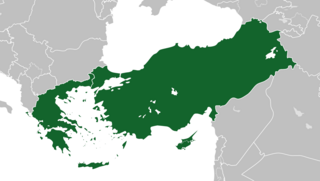
Hellenoturkism is a political concept that encompasses two things: a fact of civilization of the Greek and Turkish peoples and cultures, and a political ideology based on the above civilizational phenomenon, which aims at establishing a Hellenic-Turkish political ensemble, national and cultural identity.
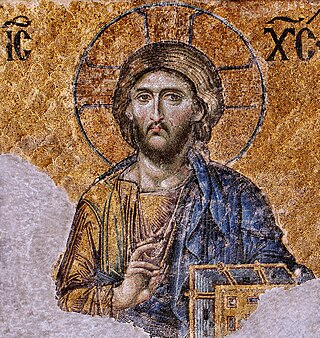
This is a timeline of the presence of Eastern Orthodoxy in Greece. The history of Greece traditionally encompasses the study of the Greek people, the areas they ruled historically, as well as the territory now composing the modern state of Greece.

This is a timeline of the presence of Eastern Orthodoxy in Greece from 1821 to 1924. The history of Greece traditionally encompasses the study of the Greek people, the areas they ruled historically, as well as the territory now composing the modern state of Greece.

The Peloponnesian Folklore Foundation ‘Vas. Papantoniou’ or PFF is a nonprofit cultural institution and museum based in Nafplion, Greece. It was founded in 1974 by the folklorist and scenic designer Ioanna Papantoniou in memory of her father Vasilios Papantoniou. The aim of PFF is the research, preservation, study and presentation of the material culture of the Greeks.

The celebration of the Greek Revolution of 1821, less commonly known as Independence Day, takes place in Greece, Cyprus and Greek diaspora centers on 25 March every year, coinciding with the Feast of the Annunciation.
Benjamin of Lesbos was a Greek monk, scholar, and politician who was a significant figure in the Modern Greek Enlightenment.

Vasileios Syros is a Greek-Finnish historian of political thought, Full Professor and Holder of the Greek Chair at Jawaharlal Nehru University in New Delhi. He is also a Distinguished Fellow at the Centre for Military History and Conflict Research at the United Service Institution of India, Director of the Early Modern Greek Culture Program at The Medici Archive Project in Florence, Italy, Senior Research Fellow at the Institute for European Global Studies at the University of Basel, and Life Member of Clare Hall at the University of Cambridge. His main research and teaching interests lie in the comparative examination of the medieval and early modern Christian, Islamic, and Jewish political traditions. A second cluster of his research looks at intercultural contacts between pre-modern Europe and non-Western societies and polities, especially the Byzantine, Mughal, and Ottoman Empires. Syros also works on the comparative study of diverse models of leadership and cultural diplomacy.

Petros Vrailas Armenis was a Greek philosopher, liberal politician, and diplomat from Corfu (Kerkyra) in the Ionian Islands. He was politically active during the era of British rule, being elected president of the protectorate's Legislative Assembly. After the islands were ceded to the Kingdom of Greece in 1864, he became an MP for Corfu in the Hellenic Parliament and served as a Greek diplomat, including as Minister of Foreign Affairs.















